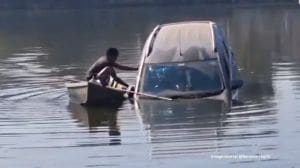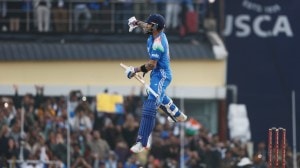The sad irony of Balkan exodus
During the drive from Belgrade to Pristina, my Serb driver, Draagen Jujinovic, pulled the car by the side of a Serbian armoured carrier. ...

During the drive from Belgrade to Pristina, my Serb driver, Draagen Jujinovic, pulled the car by the side of a Serbian armoured carrier. He felt secure “with friends”, he said, some of whom had served with him in the armed action in Bosnia. As he picked up a cup of tea from the wayside cafe, lit a cigarette and decided to rest (“for exactly half an hour”, he announced), my thoughts drifted to the conversation I had with some western academics in New York. They were busy organising international seminars on the “ethics of humanitarian armed intervention” to save local populations.
It seemed a contradiction in terms. Armed intervention to save lives? Under whose auspices? The United Nations was not being mentioned at all. I hate conspiracy theories but I had a strange feeling that soon think tanks around the world, including India, would be mobilised and a universal consensus would be sought. And now that the massive NATO intervention to “save lives” is on, I am wondering if the seminar circuit hasreached New Delhi by now. I would like to know because I hate nasty little conspiracy theories to germinate in my suspicious head.
I was jolted out of my reverie abruptly by Draagen, honking twice as a sort of hello to his soldier friends by the side of the parked armoured carrier on the Belgrade-Pristina highway.
Since this was same days before NATO action, there was absolutely no fear in the heart of a Serb like Draagen, to drive right up to the Grand hotel in the heart of Kosovo’s capital. But he refused to drive me outside the security of Pristina. The only way out was to switch to a local Alban-ian driver. “Only a Mus-salman can drive you into the interior”, Dra-agen himself helpfully advised.
This, I discovered, was what every foreign correspondent was doing: drive from Belgrade to Pristina in a Serb taxi and hire a “Mussalman” taxi from Pristina onwards.
The irony is that it was a “Mussalman” taxi driver, a big man with grimy teeth, who introduced me to the monument which was, in manyways, at the heart of the conflict in Kosovo. The monument, on raised platform, is a square column in the middle of the windswept fields barely a kilometer from Pristina. It was here that the Serbs fought a historic battle against the Turks on June 28, 1389.
The remarkable fact is that the Serbs lost the battle and yet they celebrate the battle of Kosovo.
Embedded in this paradox is a clue to the Serb mind. “Even though we lost the battle”, says Radovan at the Press Centre at the Grand hotel, “we won the war in a much larger sense.” How? The Serbs are unanimous that it was their stout resistance, the los-ses they inflicted on the Turks, that “halted the march of Islam towards Europe.”
This somewhat exaggerated sense of gran-deur about their place in history may have dominated Serb consciousness throughout history, but the fact of the matter is that subsequent to 1389 the Serbs remained under the Turks until the First World War when the Ottoman Empire was dismantled. In Tito’s Yugoslavia, Kosovowas an autonomous province just as Serbia was. But in 1989, sensing the demise of communism, Slobodan Milosevic swiftly shifted onto a platform of extreme nationalism.
And this rapid shifting of gear onto nationalism is etched even on the monument to the battle of Kosovo. There are now on this monument two dates inscribed: 1389-1989. What does the inscription of the later date, 1989, on the monument imply? It means that extreme Serb nationalism was reinvented as a creed by Milosevic in 1989.
The embers of this brand of nationalism have been stoked, artificially stimulated, throughout this past decade. For example, Serbian officials do not refer to Kosovo but to “Kosovo and Metohija” (pronounced Metokhia). A Serbian official explained to me that “Metohus is Greek for church property.” By this definition all of Kosovo is “church property”.Indeed, the territory is strewn with some of the most exquisite Orthodox churches including the one in Granica, near Pristina, built in 1320. Over hundreds of yearsof Balkan history, the demography of Kosovo changed. Today, 90 percent of its population consists of ethnic Albanians who happen to practice a moderate variety of Islam.
The remarkable fact is that in spite of the overwhelming Albanian preponderance, the great Christian monuments in the province have remained untouched. In fact it was a “Mussalman” driver who drove me to some of these monuments. In fact there was a substantial Orthodox congregation at Granica when I visited it.
In today’s context the Americans are the undisputed heroes of every ethnic Albanian. The supreme irony that those who have turned to the Americans as their saviours are today streaming out in hundreds of thousands as refugees with nowhere to go. For a long time they will remain the symbols of the inability of the world’s only superpower to save them, indeed, to have been unintentionally responsible for their plight as homeless, ethnically cleansed, consigned to their fate as the most wretched of the earth.


- 01
- 02
- 03
- 04
- 05





























